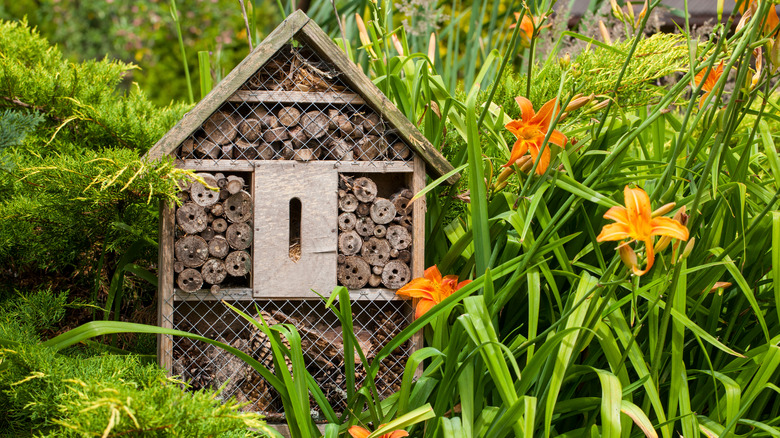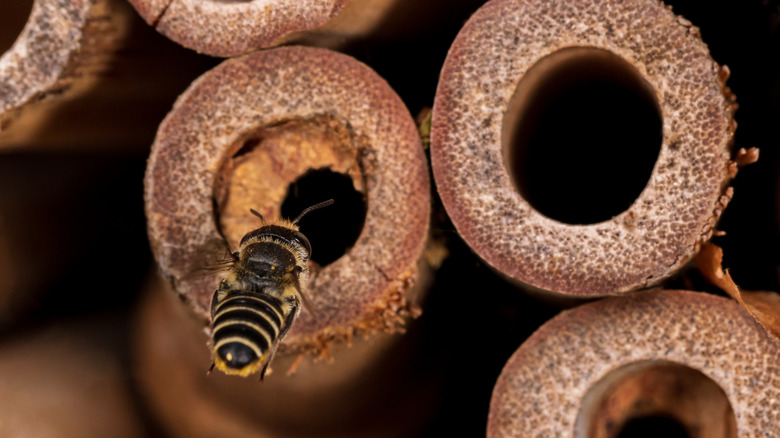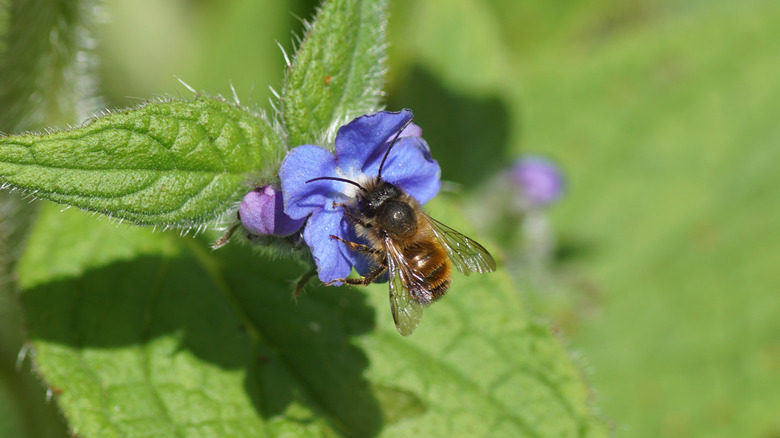The Benefits Of Having A Bee House In Your Yard
Bees play a big part in society — you could argue we wouldn't be a society without them! 75% of the crops we eat need to be pollinated by an animal or insect to develop fruit, according to NC State Extension, and bees do some of that pollinating. While you may think of honey bees as the primary pollinators, native bees do a significant amount, too. Native bees are small, solitary bees that work and nest alone rather than going home to a hive each day. Many of these bees nest in the ground, but some prefer to nest in wood or crevices, and these are the ones that benefit from bee houses. Bee houses (also called condos, huts, or hotels) provide shelter to native bees and attract more of them to your yard, which will help your plants get pollinated.
You can purchase a bee house, make one from wood planks, or gather stems and assemble one that way. Once you have your bee house, leave it in a location with morning sunlight. The bees may not see it right away, but it'll be used once they do, so give them some time before you write it off as not working.
Provide shelter for your local native bees
Solitary bees don't report to a queen. Instead, the mother bees build their own nests, lay their eggs, and provide pollen and nectar for their larvae until they mature to their pupae stage. Then, their kids grow up and move out, and the cycle begins again with the new generation of bees. Bee houses will help these working mothers a lot by providing them with houses next to their food supply. In other words, it gives them a place to live next to your garden, where they pollinate. If they have to travel too far to get food for their kids, they risk the nests being used by parasitic bees or invaded by parasitic pests and other predators.
Parasitic bees? It sounds strange, but there are three types of solitary bees: the builders who build their own nests, the renters who find pre-built housing (i.e., empty nests or crevices in structures), and parasites, who lay their eggs in other bees' nests. Renters and parasites are the only ones who will use bee houses, but they still need a house, too.
Draw more pollinators into your yard
The more pollinators, the better. If a plant has seeds, it needs to be pollinated. Whether that's by wind, insects, water, or animals is up to the plant, but bees and other pollinators help life carry on when they pollinate. Animals, insects, and humans can all continue eating when plants produce seeds for new plants, which can't happen without pollination. We can even benefit from flowering plants that we don't eat. They help reduce carbon dioxide, prevent erosion, purify water, and can be used medicinally, depending on the plant.
By setting up a few bee houses in your yard, you're inviting pollinators to come into your yard and stay there to pollinate your edible and ornamental gardens. Be sure to provide your residents with plenty of food so they'll want to stay there because they'll want to move on if they don't have food readily available.
Bees aren't the only pollinators you'll bring into your yard. Solitary wasps sound like unwanted visitors but are just as important as bees. These wasps aren't unpredictable; they won't bother you unless you bother them, and they pollinate lots of plants just like bees do, so they're good to keep around.


